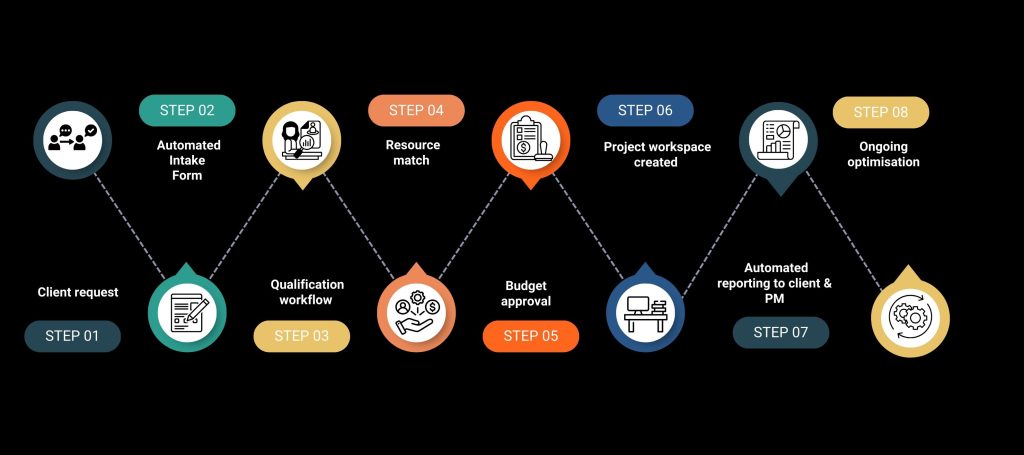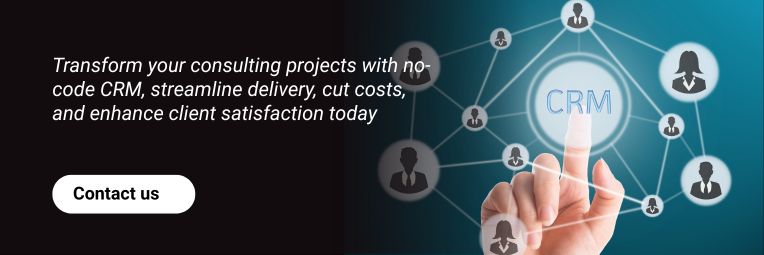Consulting firms are moving more and more to no-code CRM as a way to execute project management consulting more efficiently, minimise non-billable work, and provide quicker client value. No-code/low-code market is expanding at a brisk pace. Enterprise adoption of no-code tools has reached a critical mass in 2024-25 and is rapidly gaining momentum as companies move towards speed and agility.
By 2024, the global CRM market had surpassed an approximate of USD 100 billion, and it is expected to grow as organisations venture into customer and project orchestration platforms. At the same time, no-code development platforms should experience CAGRs in the tens of per cent over the decade, allowing business groups to develop custom CRM workflows with no engineering backlog. These two trends are a strategic opportunity for project management consulting and project management consulting services to incorporate no-code CRM as the delivery backbone.
Why Should Consulting Firms Have No-Code CRM ?
The consultants consist of distributed teams, multiple projects, constrained SLAs and elevated client reporting anticipations. Data reveals that there is a significant amount of employee time which is not billable, usually administrative and coordination work which consumes margins. Intake automation, approvals, time capture and reporting, and no-code CRM plans shift consultant effort to billable work and utilisation. A study shows that approximately 30-31 per cent of employee time goes to waste, and thus the economic advantage of automation is highlighted.
Basic methods in which consulting firms use no-code CRM to project manage.
- Client Intake to project launch – Automate proposal approvals, SOW capture and resource reservation such that new projects can be made live within days, not weeks.
- Resource Planning and Utilisation – Visual boards and automation compute utilisation rates and surface bench capacity to redeploy.
- Workflow Automation/Approvals – Auto-route timesheets/expenses and change requests to decrease administrative lag.
- Real-time Dashboards and KPIs – Consolidated project financials, utilisation, margin and milestone tracking to enable faster and data-driven decisions.
- Client Collaboration Portals – Restricted access for clients to see status, invoices and deliverables, enhancing transparency.
All these capabilities are directly associated with common outcomes of project management consulting: a faster cycle time, better margins and increased client satisfaction.
Economic Benefits
- Reduced Operating Expense: Less dependence on bespoke IT development and protracted vendor deployments, quicker ROI using configurable no-code CRM.
- Greater Billable Utilisation: Increasing administrative time to billable work is a significant revenue-generating step per consultant. The industry analysis connects improvements in the profit margin with non-billable reductions. (InspireIP)
- Scalable Delivery: Templates and reusable automation allow project management consulting firms to scale repeatable models of delivery across clients.
- Reduced time-to-value: Projects and dashboards can deploy within weeks and allow consultancies to present quick wins and retain clients.
Benefits vs Impact
Benefit | Impact on Consulting Firms |
Automated client intake & onboarding | Reduces project setup timelines by 30 to 40 per cent and guarantees quicker revenue collection and minimised administrative choke points. |
Resource optimisation & utilisation tracking | Optimises billable utilisation rates, lowers unproductive bench expenses and allocates the appropriate consultant to the appropriate project. |
Real-time project financial dashboards | Gives visibility of margins, budgets and forecasts; allows financial control to operate proactively and cost overruns to be identified early. |
Client collaboration portals | Enhances client trust and satisfaction by offering real-time access to deliverables, status updates, and invoices; strengthens client retention. |
Workflow automation (approvals, reminders, escalations) | Cuts manual admin work by up to 50%; reduces delays in expense approvals, timesheets, and scope change requests. |
Compliance & documentation management | Centralises audit trails, contracts, and compliance records; minimises risks of data silos and ensures regulatory readiness. |
Low IT dependency & configurability | Reduces the need for dedicated IT teams; enables consultants to build custom workflows quickly without coding, lowering operational costs. |
Integration with existing tools (Slack, Teams, ERP) | Provides the ability to easily work together with and transfer data to various platforms; minimises unnecessary duplication of efforts and mistakes. |
Use Case
One mid-sized management consulting firm implemented a no-code CRM system to replace spreadsheets and email-based approvals. In six weeks it automated intake, shortened the time to billable start by 40 % and provided weekly client dashboards that enhanced client renewal conversations. The result is more efficient use and quantifiable margin improvement.
Future Outlook
CRM platforms will continue to add AI-based predictive features like resource allocation, intelligent risk alerts and automated narrative reporting as a no-code solution. With the growing CRM market and no-code ecosystems, CRM for consulting will cease to be a tactical tool and turn into a strategic platform for project management consulting services so that the firms could provide their packaged outcome that would be scalable instead of customised effort. The issue here is that their competitiveness has led to quicker growth in user numbers and the quantity of applications. The point is that the competitiveness has brought them faster increases in the number of users and applications.

Conclusion
In project management consulting firms, no-code CRM is not just a convenient thing; it is a source of operational efficiency, margin growth and transparency to clients. Companies which embrace no-code CRM today will be in a position to scale delivery, remove non-billable drag and compete on results in the future.









